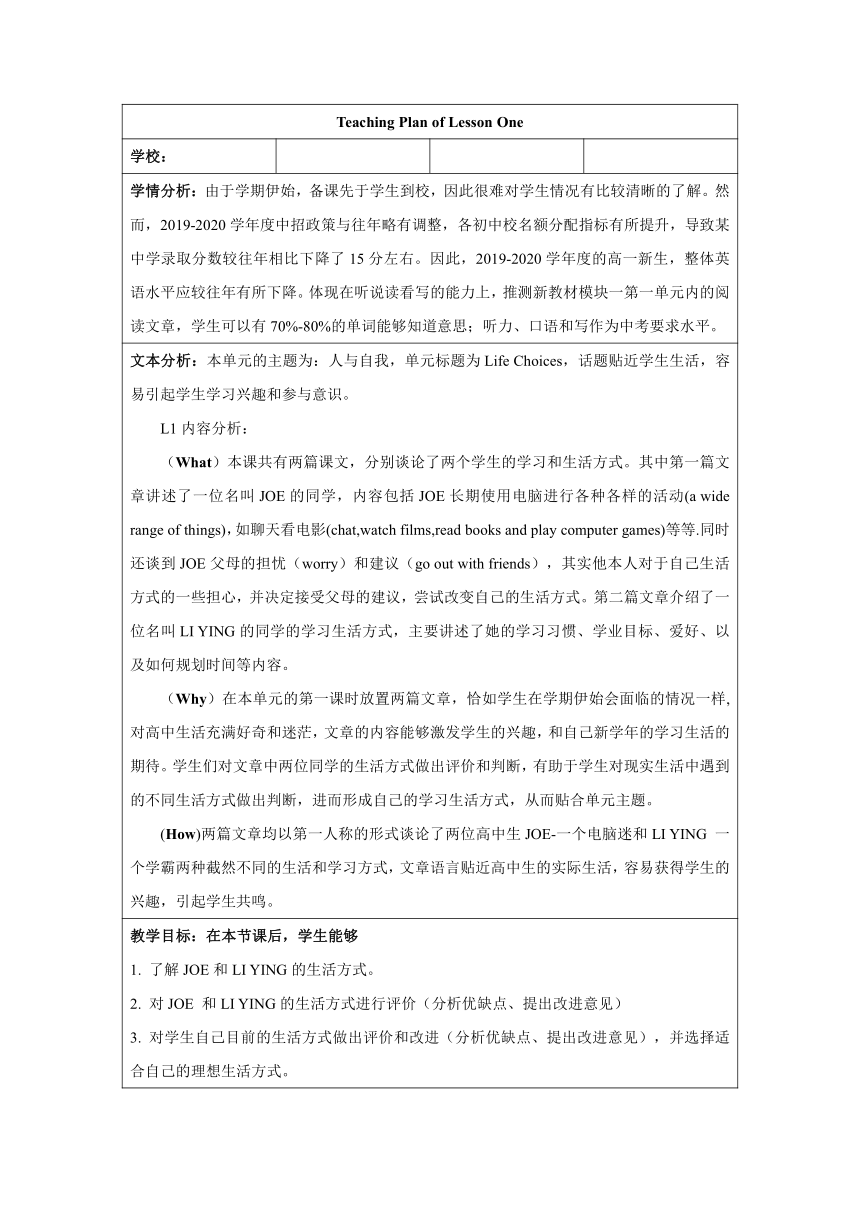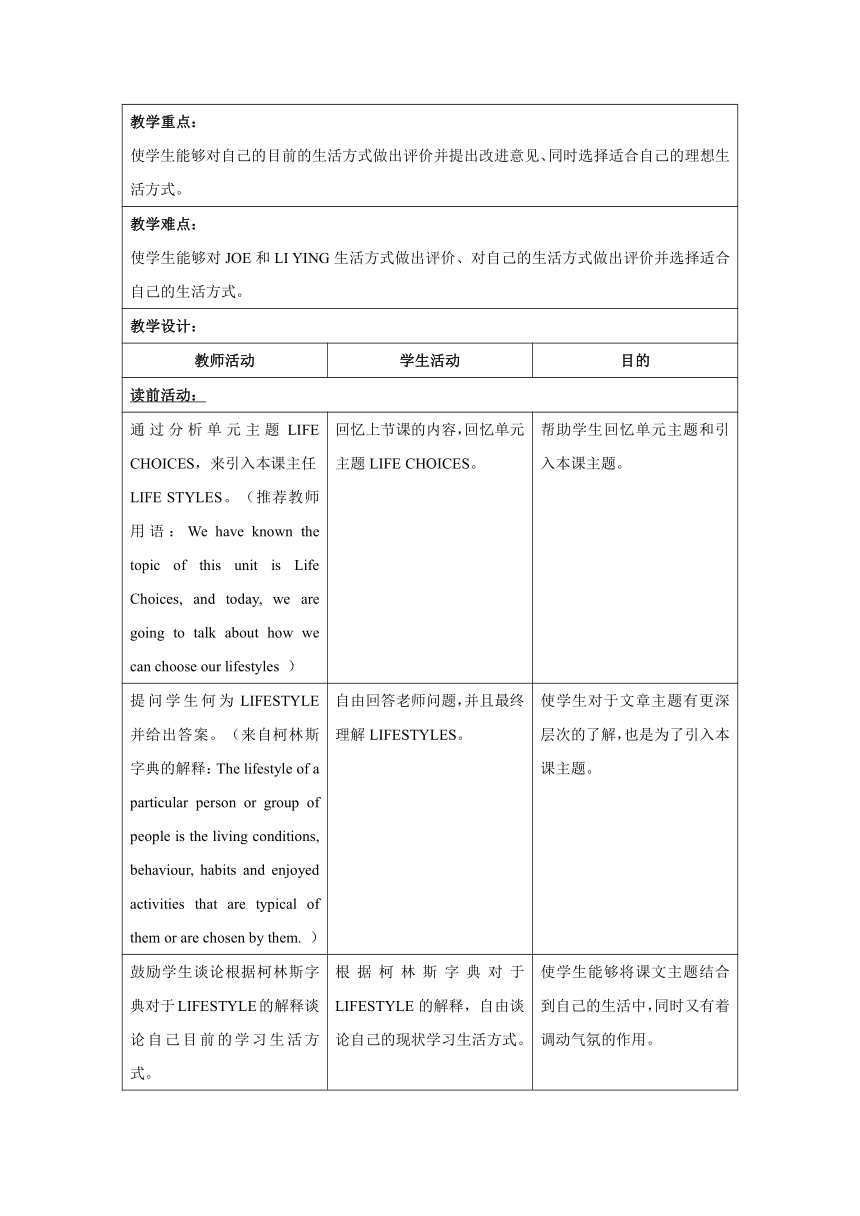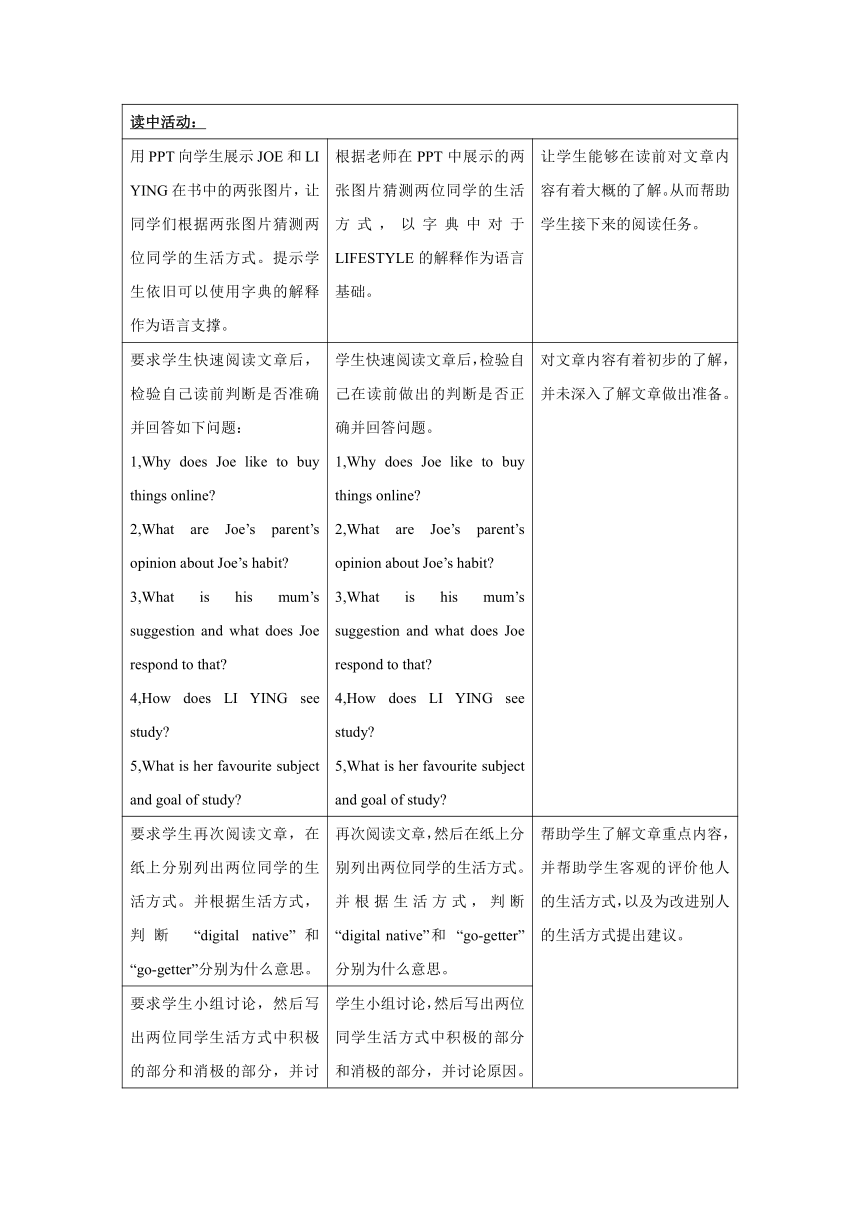高中英语北师大版(2019)必修一:Unit 1 Lesson 1 Lifestyles 教学设计
文档属性
| 名称 | 高中英语北师大版(2019)必修一:Unit 1 Lesson 1 Lifestyles 教学设计 |

|
|
| 格式 | doc | ||
| 文件大小 | 64.0KB | ||
| 资源类型 | 教案 | ||
| 版本资源 | 北师大版(2019) | ||
| 科目 | 英语 | ||
| 更新时间 | 2020-08-18 00:00:00 | ||
图片预览



文档简介
Teaching Plan of Lesson One
学校:
学情分析:由于学期伊始,备课先于学生到校,因此很难对学生情况有比较清晰的了解。然而,2019-2020学年度中招政策与往年略有调整,各初中校名额分配指标有所提升,导致某中学录取分数较往年相比下降了15分左右。因此,2019-2020学年度的高一新生,整体英语水平应较往年有所下降。体现在听说读看写的能力上,推测新教材模块一第一单元内的阅读文章,学生可以有70%-80%的单词能够知道意思;听力、口语和写作为中考要求水平。
文本分析:本单元的主题为:人与自我,单元标题为Life Choices,话题贴近学生生活,容易引起学生学习兴趣和参与意识。 L1内容分析:
(What)本课共有两篇课文,分别谈论了两个学生的学习和生活方式。其中第一篇文章讲述了一位名叫JOE的同学,内容包括JOE长期使用电脑进行各种各样的活动(a wide range of things),如聊天看电影(chat,watch films,read books and play computer games)等等.同时还谈到JOE父母的担忧(worry)和建议(go out with friends),其实他本人对于自己生活方式的一些担心,并决定接受父母的建议,尝试改变自己的生活方式。第二篇文章介绍了一位名叫LI YING的同学的学习生活方式,主要讲述了她的学习习惯、学业目标、爱好、以及如何规划时间等内容。
(Why)在本单元的第一课时放置两篇文章,恰如学生在学期伊始会面临的情况一样,对高中生活充满好奇和迷茫,文章的内容能够激发学生的兴趣,和自己新学年的学习生活的期待。学生们对文章中两位同学的生活方式做出评价和判断,有助于学生对现实生活中遇到的不同生活方式做出判断,进而形成自己的学习生活方式,从而贴合单元主题。
(How)两篇文章均以第一人称的形式谈论了两位高中生JOE-一个电脑迷和LI YING 一个学霸两种截然不同的生活和学习方式,文章语言贴近高中生的实际生活,容易获得学生的兴趣,引起学生共鸣。
教学目标:在本节课后,学生能够 了解JOE和LI YING的生活方式。
对JOE 和LI YING的生活方式进行评价(分析优缺点、提出改进意见)
对学生自己目前的生活方式做出评价和改进(分析优缺点、提出改进意见),并选择适合自己的理想生活方式。
教学重点: 使学生能够对自己的目前的生活方式做出评价并提出改进意见、同时选择适合自己的理想生活方式。
教学难点: 使学生能够对JOE和LI YING生活方式做出评价、对自己的生活方式做出评价并选择适合自己的生活方式。
教学设计:
教师活动 学生活动 目的
读前活动:
通过分析单元主题LIFE CHOICES,来引入本课主任LIFE STYLES。(推荐教师用语:We have known the topic of this unit is Life Choices, and today, we are going to talk about how we can choose our lifestyles ) 回忆上节课的内容,回忆单元主题LIFE CHOICES。 帮助学生回忆单元主题和引入本课主题。
提问学生何为LIFESTYLE 并给出答案。(来自柯林斯字典的解释:The lifestyle of a particular person or group of people is the living conditions, behaviour, habits and enjoyed activities that are typical of them or are chosen by them. ) 自由回答老师问题,并且最终理解LIFESTYLES。 使学生对于文章主题有更深层次的了解,也是为了引入本课主题。
鼓励学生谈论根据柯林斯字典对于LIFESTYLE的解释谈论自己目前的学习生活方式。 根据柯林斯字典对于LIFESTYLE的解释,自由谈论自己的现状学习生活方式。 使学生能够将课文主题结合到自己的生活中,同时又有着调动气氛的作用。
读中活动:
用PPT向学生展示JOE和LI YING在书中的两张图片,让同学们根据两张图片猜测两位同学的生活方式。提示学生依旧可以使用字典的解释作为语言支撑。 根据老师在PPT中展示的两张图片猜测两位同学的生活方式,以字典中对于LIFESTYLE的解释作为语言基础。 让学生能够在读前对文章内容有着大概的了解。从而帮助学生接下来的阅读任务。
要求学生快速阅读文章后,检验自己读前判断是否准确并回答如下问题: 1,Why does Joe like to buy things online?
2,What are Joe’s parent’s opinion about Joe’s habit?
3,What is his mum’s suggestion and what does Joe respond to that?
4,How does LI YING see study?
5,What is her favourite subject and goal of study? 学生快速阅读文章后,检验自己在读前做出的判断是否正确并回答问题。
1,Why does Joe like to buy things online?
2,What are Joe’s parent’s opinion about Joe’s habit?
3,What is his mum’s suggestion and what does Joe respond to that?
4,How does LI YING see study?
5,What is her favourite subject and goal of study? 对文章内容有着初步的了解,并未深入了解文章做出准备。
要求学生再次阅读文章,在纸上分别列出两位同学的生活方式。并根据生活方式,判断 “digital native”和 “go-getter”分别为什么意思。 再次阅读文章,然后在纸上分别列出两位同学的生活方式。并根据生活方式,判断 “digital native”和 “go-getter”分别为什么意思。 帮助学生了解文章重点内容,并帮助学生客观的评价他人的生活方式,以及为改进别人的生活方式提出建议。
要求学生小组讨论,然后写出两位同学生活方式中积极的部分和消极的部分,并讨论原因。然后对两位同学的生活方式提出改进意见。 学生小组讨论,然后写出两位同学生活方式中积极的部分和消极的部分,并讨论原因。然后对两位同学的生活方式提出改进意见。
读后活动:
要求学生和同伴谈论自己目前的生活方式,然后要求学生自己以及同伴对自己的现阶段生活方式做出评价(积极方面,消极方面)并共同提出改进意见,随后教师寻找准备较为认真的同学来做展示。 和同伴谈论自己目前的生活方式,随后和同伴一起对现阶段的生活方式提出做出评价(积极方面,消极方面)和提出改进意见。做好记录,准备展示。 能够帮助学生对身边同学乃至自己的现阶段的生活方式做出评价,并提出改进意见。
要求学生谈论自己理想的生活方式,谈论理想生活方式和现有生活方式的不同,并谈论为实现理想生活方式应做出的努力。 谈论自己理想的生活方式,谈论理想生活方式和现有生活方式的不同,并谈论为实现理想生活方式应做出的努力。 学生谈论理想的生活方式,实际上就是一种人生选择。而为理想生活所做出的努力,也是人生选择的一部分。
板书设计:
LIFE CHOICES
LIFESYTLES:
The lifestyle of a particular person or group of people is the living conditions, behaviour, habits and enjoyed activities that are typical of them or are chosen by them.
I AM A DIGITAL NATIVE I AM A GO-GETTER
chat with friends online 1, study with a clear goal
play computer games 2, be attentive in what they do
... ...
作业: 阅读文章“A COUCH POTATO”和“A WORKAHOLIC”,分别解释两个题目的分别指拥有什么样生活方式的人,具体表现是什么,有何积极和消极方面,并提出改进意见。
附录: A Couch Potato
Forty-three-year-old Brian Blakey from Birmingham is sitting on his sofa and telling me about his perfect day.
When I wake up I don't get up immediately. I turn on the television and watch the children's programmes and old movies until about half-past ten. Then I get up, go downstairs and switch on the TV in the living room. For lunch, I have biscuits and a glass of milk, and I watch the news. In the afternoon, I often watch another old film – they're showing some good ones at the moment. In the evenings, I often watch TV series or sport and the news again. I like the main news at six o'clock. At nine thirty, if there is a good play on BBC 2, I switch over and watch it. Then at night, I watch more films and I usually switch off the TV at about two o'clock. I never watch TV all night.
I watch TV for sixteen or seventeen hours a day. I also do some exercise every day. I take Tina, the dog, for a walk every afternoon. I don't go far, of course. I walk to the wall outside my house. I always take my portable TV and I sit on the stone wall while the dog walks round in a circle.
Of course, I couldn't live this lifestyle without a good wife. She's not here now because she's working, but she always makes my meals. We haven't got much money, you know, but we're happy. Sit down and watch TV. Here's the remote control. You've got the world at your feet. And in your hand. Great!
A Workaholic
Thirty-six-year-old Bob Black is sitting at his desk and working his way through his paperwork. I normally wake up about five minutes before my alarm clock goes off. As soon as I hear my alarm clock, I jump out of my bed. It takes me less than fifteen minutes to wash, get changed, have breakfast, leave home and get on a bus.
I am always the first person to get to the office. The mornings are always very busy and the afternoons are even busier! Meetings and phone calls take up a large part of the day. Every minute of the day is filled with urgent matters. By around eight o'clock, I usually find some time to do my own paperwork and answer some personal e-mails.
When I get home at about ten, I look at some documents that I bring back from the office so that I can be ready for the next day's work. I get to bed around midnight when my wife and children are already asleep.
I seldom have time for fun and other activities with my family. My family complains about it. But I try to work hard so that I can make more money for them. Besides, I get bored if there's nothing to do. I like being busy.
学校:
学情分析:由于学期伊始,备课先于学生到校,因此很难对学生情况有比较清晰的了解。然而,2019-2020学年度中招政策与往年略有调整,各初中校名额分配指标有所提升,导致某中学录取分数较往年相比下降了15分左右。因此,2019-2020学年度的高一新生,整体英语水平应较往年有所下降。体现在听说读看写的能力上,推测新教材模块一第一单元内的阅读文章,学生可以有70%-80%的单词能够知道意思;听力、口语和写作为中考要求水平。
文本分析:本单元的主题为:人与自我,单元标题为Life Choices,话题贴近学生生活,容易引起学生学习兴趣和参与意识。 L1内容分析:
(What)本课共有两篇课文,分别谈论了两个学生的学习和生活方式。其中第一篇文章讲述了一位名叫JOE的同学,内容包括JOE长期使用电脑进行各种各样的活动(a wide range of things),如聊天看电影(chat,watch films,read books and play computer games)等等.同时还谈到JOE父母的担忧(worry)和建议(go out with friends),其实他本人对于自己生活方式的一些担心,并决定接受父母的建议,尝试改变自己的生活方式。第二篇文章介绍了一位名叫LI YING的同学的学习生活方式,主要讲述了她的学习习惯、学业目标、爱好、以及如何规划时间等内容。
(Why)在本单元的第一课时放置两篇文章,恰如学生在学期伊始会面临的情况一样,对高中生活充满好奇和迷茫,文章的内容能够激发学生的兴趣,和自己新学年的学习生活的期待。学生们对文章中两位同学的生活方式做出评价和判断,有助于学生对现实生活中遇到的不同生活方式做出判断,进而形成自己的学习生活方式,从而贴合单元主题。
(How)两篇文章均以第一人称的形式谈论了两位高中生JOE-一个电脑迷和LI YING 一个学霸两种截然不同的生活和学习方式,文章语言贴近高中生的实际生活,容易获得学生的兴趣,引起学生共鸣。
教学目标:在本节课后,学生能够 了解JOE和LI YING的生活方式。
对JOE 和LI YING的生活方式进行评价(分析优缺点、提出改进意见)
对学生自己目前的生活方式做出评价和改进(分析优缺点、提出改进意见),并选择适合自己的理想生活方式。
教学重点: 使学生能够对自己的目前的生活方式做出评价并提出改进意见、同时选择适合自己的理想生活方式。
教学难点: 使学生能够对JOE和LI YING生活方式做出评价、对自己的生活方式做出评价并选择适合自己的生活方式。
教学设计:
教师活动 学生活动 目的
读前活动:
通过分析单元主题LIFE CHOICES,来引入本课主任LIFE STYLES。(推荐教师用语:We have known the topic of this unit is Life Choices, and today, we are going to talk about how we can choose our lifestyles ) 回忆上节课的内容,回忆单元主题LIFE CHOICES。 帮助学生回忆单元主题和引入本课主题。
提问学生何为LIFESTYLE 并给出答案。(来自柯林斯字典的解释:The lifestyle of a particular person or group of people is the living conditions, behaviour, habits and enjoyed activities that are typical of them or are chosen by them. ) 自由回答老师问题,并且最终理解LIFESTYLES。 使学生对于文章主题有更深层次的了解,也是为了引入本课主题。
鼓励学生谈论根据柯林斯字典对于LIFESTYLE的解释谈论自己目前的学习生活方式。 根据柯林斯字典对于LIFESTYLE的解释,自由谈论自己的现状学习生活方式。 使学生能够将课文主题结合到自己的生活中,同时又有着调动气氛的作用。
读中活动:
用PPT向学生展示JOE和LI YING在书中的两张图片,让同学们根据两张图片猜测两位同学的生活方式。提示学生依旧可以使用字典的解释作为语言支撑。 根据老师在PPT中展示的两张图片猜测两位同学的生活方式,以字典中对于LIFESTYLE的解释作为语言基础。 让学生能够在读前对文章内容有着大概的了解。从而帮助学生接下来的阅读任务。
要求学生快速阅读文章后,检验自己读前判断是否准确并回答如下问题: 1,Why does Joe like to buy things online?
2,What are Joe’s parent’s opinion about Joe’s habit?
3,What is his mum’s suggestion and what does Joe respond to that?
4,How does LI YING see study?
5,What is her favourite subject and goal of study? 学生快速阅读文章后,检验自己在读前做出的判断是否正确并回答问题。
1,Why does Joe like to buy things online?
2,What are Joe’s parent’s opinion about Joe’s habit?
3,What is his mum’s suggestion and what does Joe respond to that?
4,How does LI YING see study?
5,What is her favourite subject and goal of study? 对文章内容有着初步的了解,并未深入了解文章做出准备。
要求学生再次阅读文章,在纸上分别列出两位同学的生活方式。并根据生活方式,判断 “digital native”和 “go-getter”分别为什么意思。 再次阅读文章,然后在纸上分别列出两位同学的生活方式。并根据生活方式,判断 “digital native”和 “go-getter”分别为什么意思。 帮助学生了解文章重点内容,并帮助学生客观的评价他人的生活方式,以及为改进别人的生活方式提出建议。
要求学生小组讨论,然后写出两位同学生活方式中积极的部分和消极的部分,并讨论原因。然后对两位同学的生活方式提出改进意见。 学生小组讨论,然后写出两位同学生活方式中积极的部分和消极的部分,并讨论原因。然后对两位同学的生活方式提出改进意见。
读后活动:
要求学生和同伴谈论自己目前的生活方式,然后要求学生自己以及同伴对自己的现阶段生活方式做出评价(积极方面,消极方面)并共同提出改进意见,随后教师寻找准备较为认真的同学来做展示。 和同伴谈论自己目前的生活方式,随后和同伴一起对现阶段的生活方式提出做出评价(积极方面,消极方面)和提出改进意见。做好记录,准备展示。 能够帮助学生对身边同学乃至自己的现阶段的生活方式做出评价,并提出改进意见。
要求学生谈论自己理想的生活方式,谈论理想生活方式和现有生活方式的不同,并谈论为实现理想生活方式应做出的努力。 谈论自己理想的生活方式,谈论理想生活方式和现有生活方式的不同,并谈论为实现理想生活方式应做出的努力。 学生谈论理想的生活方式,实际上就是一种人生选择。而为理想生活所做出的努力,也是人生选择的一部分。
板书设计:
LIFE CHOICES
LIFESYTLES:
The lifestyle of a particular person or group of people is the living conditions, behaviour, habits and enjoyed activities that are typical of them or are chosen by them.
I AM A DIGITAL NATIVE I AM A GO-GETTER
chat with friends online 1, study with a clear goal
play computer games 2, be attentive in what they do
... ...
作业: 阅读文章“A COUCH POTATO”和“A WORKAHOLIC”,分别解释两个题目的分别指拥有什么样生活方式的人,具体表现是什么,有何积极和消极方面,并提出改进意见。
附录: A Couch Potato
Forty-three-year-old Brian Blakey from Birmingham is sitting on his sofa and telling me about his perfect day.
When I wake up I don't get up immediately. I turn on the television and watch the children's programmes and old movies until about half-past ten. Then I get up, go downstairs and switch on the TV in the living room. For lunch, I have biscuits and a glass of milk, and I watch the news. In the afternoon, I often watch another old film – they're showing some good ones at the moment. In the evenings, I often watch TV series or sport and the news again. I like the main news at six o'clock. At nine thirty, if there is a good play on BBC 2, I switch over and watch it. Then at night, I watch more films and I usually switch off the TV at about two o'clock. I never watch TV all night.
I watch TV for sixteen or seventeen hours a day. I also do some exercise every day. I take Tina, the dog, for a walk every afternoon. I don't go far, of course. I walk to the wall outside my house. I always take my portable TV and I sit on the stone wall while the dog walks round in a circle.
Of course, I couldn't live this lifestyle without a good wife. She's not here now because she's working, but she always makes my meals. We haven't got much money, you know, but we're happy. Sit down and watch TV. Here's the remote control. You've got the world at your feet. And in your hand. Great!
A Workaholic
Thirty-six-year-old Bob Black is sitting at his desk and working his way through his paperwork. I normally wake up about five minutes before my alarm clock goes off. As soon as I hear my alarm clock, I jump out of my bed. It takes me less than fifteen minutes to wash, get changed, have breakfast, leave home and get on a bus.
I am always the first person to get to the office. The mornings are always very busy and the afternoons are even busier! Meetings and phone calls take up a large part of the day. Every minute of the day is filled with urgent matters. By around eight o'clock, I usually find some time to do my own paperwork and answer some personal e-mails.
When I get home at about ten, I look at some documents that I bring back from the office so that I can be ready for the next day's work. I get to bed around midnight when my wife and children are already asleep.
I seldom have time for fun and other activities with my family. My family complains about it. But I try to work hard so that I can make more money for them. Besides, I get bored if there's nothing to do. I like being busy.
同课章节目录
- Unit 1 Life Choices
- Lesson 1 Lifestyles
- Lesson 2 Understanding and Coping with Stress
- Lesson 3 Your Life Is What You Make It
- Unit 2 Sports and Fitness
- Lesson 1 The Underdog
- Lesson 2 Rules of the Game
- Lesson 3 Running and Fitness
- Unit 3 Celebrations
- Lesson 1 Spring Festival
- Lesson 2 Special Occasions
- Lesson 3 Memories of Christmas
